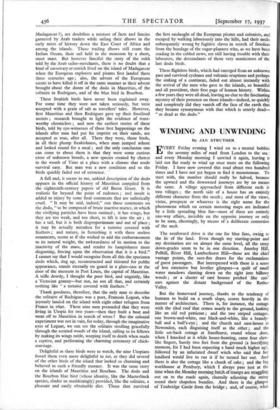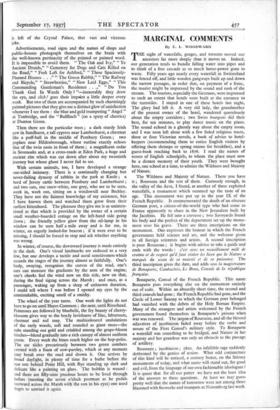WINDING AND UNWINDING
By JAN STRUTHER
EVERY Friday evening I wind on to a mental bobbin the seventy miles of road from London to the sea : and every Monday morning I unwind it again, leaving it laid out flat ready to wind up once more on the following Friday. I have now covered this road about two hundred times and I have not yet begun to find it monotonous. To start with, the number should really be halved, because the upward and the downward journeys are by no means the same. A village approached from different ends is two villages ; the north side of a house has an entirely different character from the south ; and most of the views, vistas, prospects or whatever is the right name for the phenomena which on certain motoring maps are indicated by a little spreading blue fan—most of these are entirely one-way affairs, invisible on the opposite journey or only to be seen, cheatingly, by means of a deliberate contortion of the neck.
The southward drive is the one for blue fans, owing to the lie of the land. Even though my starting-point and my destination are on almost the same level, all the steep down-grades seem to be in one direction. Anerley Hill, Polhill, River Hill, Lamberhurst Hill—these are the chief vantage points, the sure-fire draws for the exclamations of guest passengers. But interspersed with these is a score of less extensive but lovelier glimpses—a quilt of small water meadows slanting down on the right into billowy woods ; or a cluster of oast houses pricked like cats' ears against the distant background of the Rother Valley.
But the homeward journey, thanks to the tendency of humans to build on a south slope, scores heavily in the matter of architecture. There is, for instance, the cottage with the tiled roof that comes nearly to the ground, looking like an old red petticoat ; and the two striped cottages, one brown-and-white, one black-and-white, like a brandy- ball and a bull's-eye ; and the church and oast-house at Newenden, each disguising itself as the other ; and the little set-back cottage at Sandhurst, round whose door, when I knocked at it while house-hunting, came four claw- like fingers, barely two feet from the ground (a horrifying moment, for I had been expecting a hand much higher up), followed by an infuriated dwarf witch who said that her landlord would live to rue it if he turned her out. And there is also the cottage like a chunk of cake ; and the big workhouse at Pembury, which I always pass just at the time when the Monday morning batch of tramps are straggling out on to the roads again, clumsily adjusting the string round their shapeless bundles. And there is the glimpse of Tonbridge Castle from the bridge ; and, of course, what is left of the Crystal Palace, that vast and vitreous joke.
Advertisements, road signs and the names of shops and public-houses photograph themselves on the brain with the well-known pertinacity of the printed or painted word. It is impossible to avoid them. " The Oak and Ivy," " Ye Ancient Druids," " Cemetery for Dogs and Cats Killed on the Road," " Fork Left for Ashford," " These Spaciously- Planned Houses . . ." " The Green Rabbit," " The Railway and Bicycle," " Strawberries," " New Laid Eggs," " This Commanding Gentleman's Residence . .," " Do You Thank God In Words Only ? "—inexorably they draw the eye, and click! goes their imprint a little deeper every week. But two of them are accompanied by such charmingly painted pictures that they give me a distinct glow of satisfaction whenever I see them : the blue and gold trumpeting " Angel " at Tonbridge, and the " Bullfinch " (on a spray of cherries) at Dunton Green.
Then there are the particular trees ; a dark sturdy Irish yew in Sandhurst, a tall cypress near Lamberhurst, a chestnut like a puff-ball in the middle of Pembury Green ; two poplars near Hildenborough, whose outline exactly echoes that of the twin oasts in front of them ; a magnificent cedar in Sevenoaks and, at a cross-roads at Eden Park, a huge and ancient elm which was cut down after about my twentieth journey but whose ghost I never fail to see.
With certain animals, too, I have developed a strange one-sided intimacy. There is a continually changing but never-failing dynasty of rabbits in the park at Knole ; a herd of Jersey cattle between Pembury and Lamberhurst ; and two cats, one snow-white, one grey, who are to be seen, week in, week out, sitting on a windowsill near Beckley. They have not the faintest knowledge of my existence, but I have known them and watched them grow from their earliest kittenhood. The pleasure they give me is as uninten- tional as that which is provided by the owner of a certain small weather-boarded cottage on the left-hand side going down ; the friendly yellow glow from the oil-lamp in his window can be seen half a mile away and is for me, in winter, an eagerly looked-for beacon ; if it were ever to be missing, I should be forced to stop and ask whether anything was wrong.
In winter, of course, the downward journey is made entirely in the dark. One's visual landmarks are reduced to a very few, but one develops a tactile and aural sensitiveness which records the stages of the journey almost as faithfully. One's body, swaying, recognises the curves of the road, one's ears can measure the gradients by the note of the engine, one's cheeks feel the wind now on this side, now on that, during the final zigzag across the Marsh ; and once, as a passenger, waking up from a sleep of unknown duration, I could tell where I was before I opened my eyes by the unmistakable, exciting smell of a smithy.
The wheel of the year turns. One week the lights do not have to go on until Hayes Common ; the next, until Riverhead. Primroses are followed by bluebells, the fey beauty of cherry- blossom gives way to the heady lavishness of lilac, laburnum, chestnut and red may. The multicoloured undulations of the early woods, soft and rounded as giant moss—the oaks standing out gold and crinkled among the grape-bloom birches—blend gradually into a rich canopy of almost uniform green. Every week the bines reach higher on the hop-poles. The car slides precariously between two green combers crested with a foam of cow-parsley, which at any moment may break over the road and drown it. One arrives by broad daylight, in plenty of time for a bathe before the sun sets behind Point Hill, with Rye standing up dark and delicate like a painting on glass. The bobbin is wound : and there are fifty-nine precious hours to be lived through before (meeting the seven o'clock postman as he pedals eastward across the Marsh with the sun in his eyes) one need begin to unwind it again.











































 Previous page
Previous page